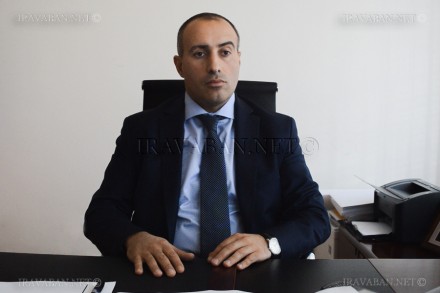Inserting a probation service will not only solve the overload issue in penitentiary institutions, but will also make budget savings, Deputy Minister of Justice Suren Krmoyan assures. Details in the interview of Iravaban.net.
Creating probation services is one of important points in the section of human rights protection and effective system of justice in the Government program. As stated it will be directed at reducing re-offending, psychological support to offenders and stimulating their social integration. How do you imagine the implementation of these provisions?
The practice of creating probation services in other countries testifies that we have an experience of quite many years. We`ve done research and it was revealed that around 30% of current prisoners and detainees have the possibility of bearing their punishment not in places of confinement. From among 4000 people who are in penitentiary institutions. around 3000 are convicts, and 1000 are detainees. In general, around 1300 of them can bear their punishment in the framework of probation service.
In the report on the works implemented by the RA Ministry of Justice in the period between May 1 and August 1 only three lines refer to the probation, and one of them is worth of attention which is very vague, it simply states: the concept of creating a probation service is being developed in the Republic of Armenia. What is it and eventually when is it planned to be inserted and operate in Armenia?
The concept has already been developed and discussed in the Public Council of the Ministry of Justice, until the end of September it will be put in circulation and we hope that the concept will be adopted in October. Moreover, in parallel to the concept we also devised draft legal acts, in particular we plan to implement the pilot experiment of that program – at least two pilots, one in Yerevan and the other in one of the regions. We`ve also started developing the educational model which will create opportunities for preparing respective specialists.
Could you please specify when the educational program is going to be approved?
We expect to develop and have it approved until the end of this year, the training program will start from January which will be continually implemented, and specialists will be prepared first of all to work in the pilot areas.
The main obstacle to this service insertion is the financial aspect, has it been solved?
Surely, certain financial savings from the budget should be applied. In the first year 840 mln AMD shall be distributed for the activities of the service, nevertheless we`ll have at least double savings as we`ll ease the overload in penitentiary institutions.
Will the financing be done only from the budget, or have you already applied to foreign donor organizations?
Donor organizations might support the preparatory activities, but the service will be financed by the budget.
After service insertion, won`t the corruption risks rise in the system?
Due to technical equipment the activities of this service will be controlled. I don`t think that there will be corruption risks, nevertheless we`ll try to hold public discussions during the process of legislative development so as all the interested parties have their voice.
What impact will the service have on the courts?
It will have a consultative status. The law will specify cases where courts and preliminary investigative bodies decide by themselves on the need to apply for consultation of the probation service.
Have you foreseen all the risks of offender influencing the probation service decisions, be it in a form of corruption or other methods, influencing the court decision as well?
Every report by the Service will be based on objective details, educational background, work experience and characteristics. Thus in majority of cases the report will be based on objective criteria, except of certain cases when the probation service officer will have to hold interviews with the relatives, friends and acquaintances of this person.
I would like you to specify what kind of model Armenia adopts for this service insertion, for example, in the Russian Federation certain efforts are being taken to realize it, and it is mentioned that the US, British and Canadian models are the most effective ones. Which model do you give preference to?
We`ll apply best European experience, also that of our neighbour Georgia, we`ve also studied the example of Croatia and other countries, and we`ll try to avoid their mistakes. In other words, we`ll insert the classic model. It assumes the activities of the probation service in 4 stages. Pre-trial, which means that before chosing a person`s restraint means, the Service shall give its respective report on that person, in the trial stage it will prepare a report for the court specifying whether this person should be punished in the form of imprisonment. During the punishment period and after the Service will apply control. It`s important that the probation service also works after freeing the convict in terms of job-finding processes, etc.































